2022年九年级中考语法专题复习-简单句课件(36张PPT)
文档属性
| 名称 | 2022年九年级中考语法专题复习-简单句课件(36张PPT) | 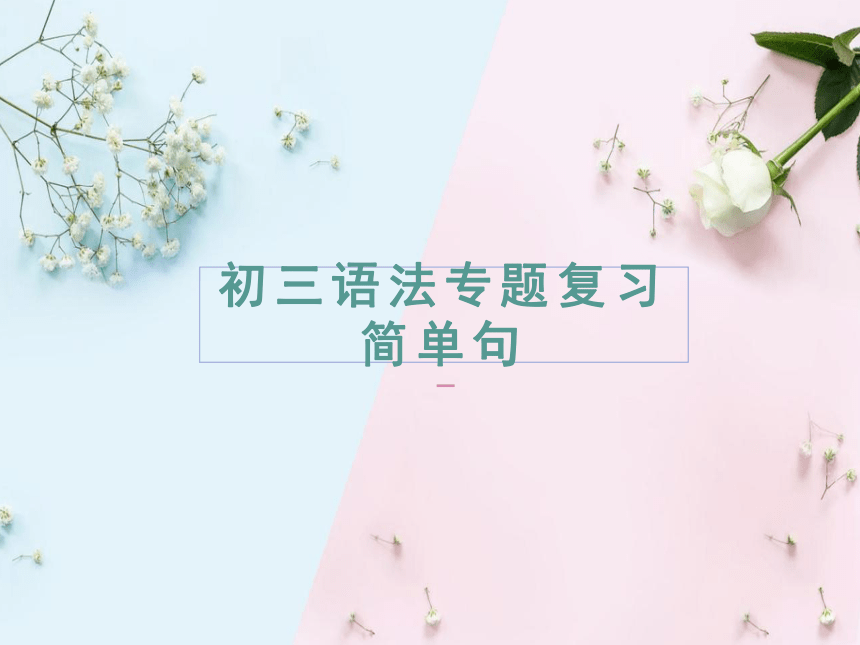 | |
| 格式 | pptx | ||
| 文件大小 | 1.7MB | ||
| 资源类型 | 教案 | ||
| 版本资源 | 通用版 | ||
| 科目 | 英语 | ||
| 更新时间 | 2022-04-12 21:08:57 | ||
图片预览

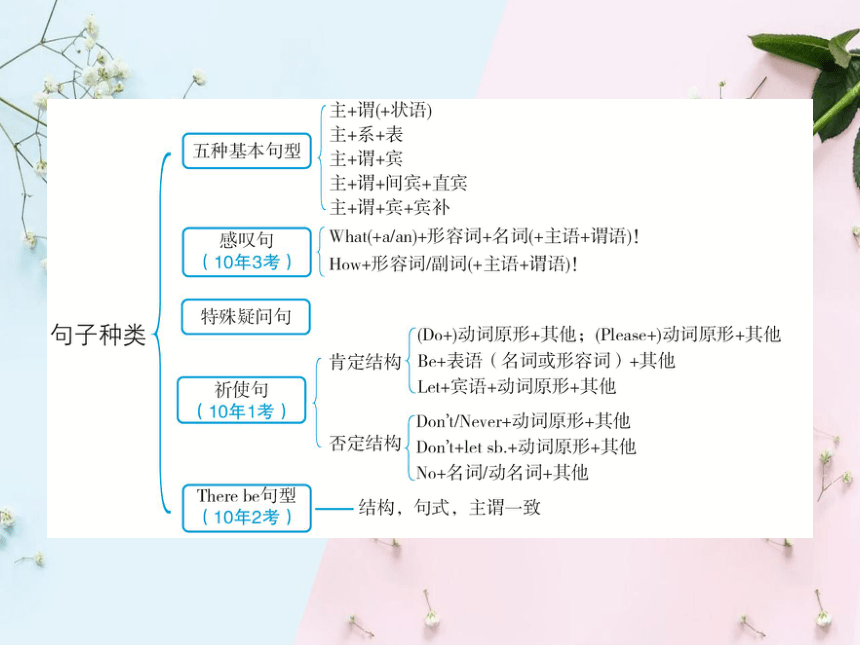

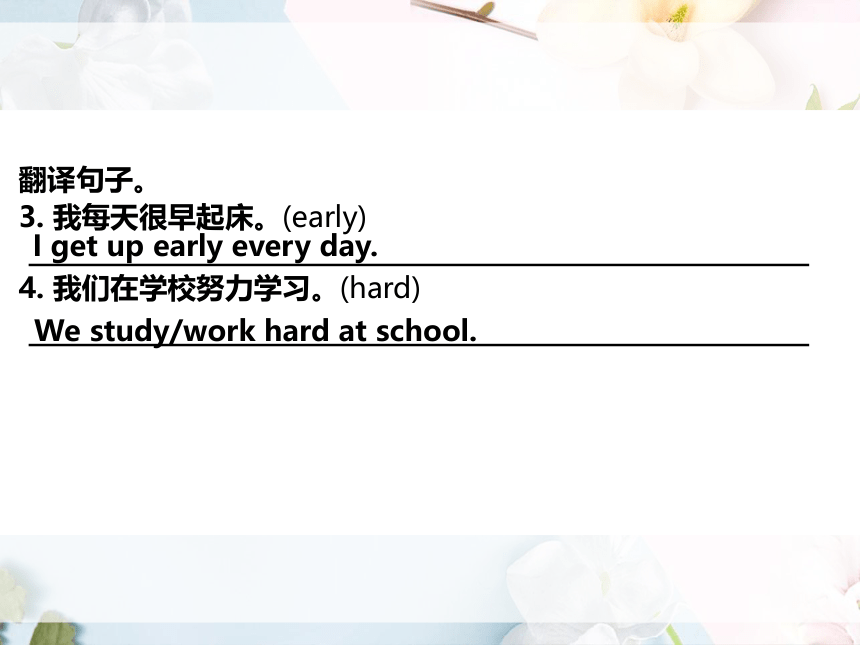
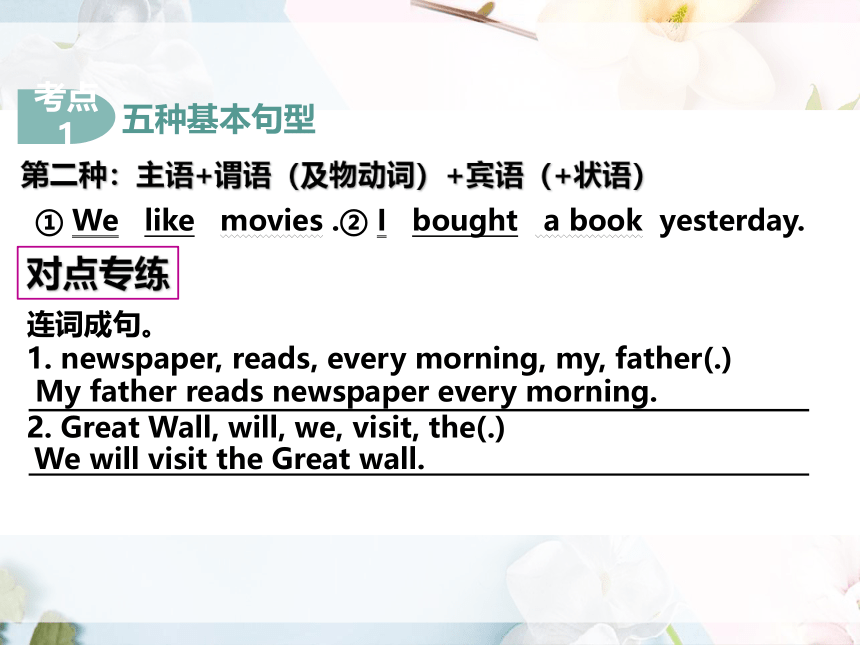
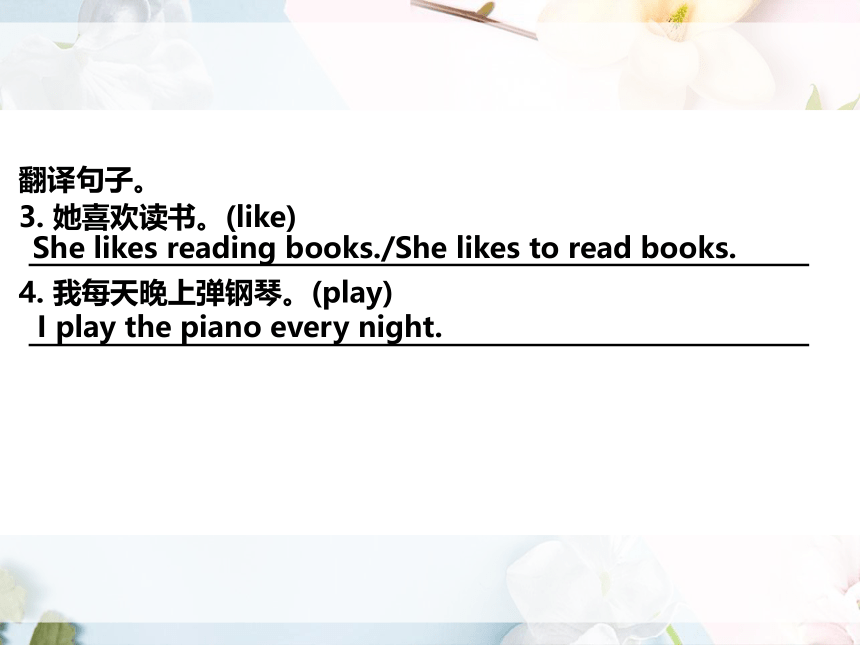
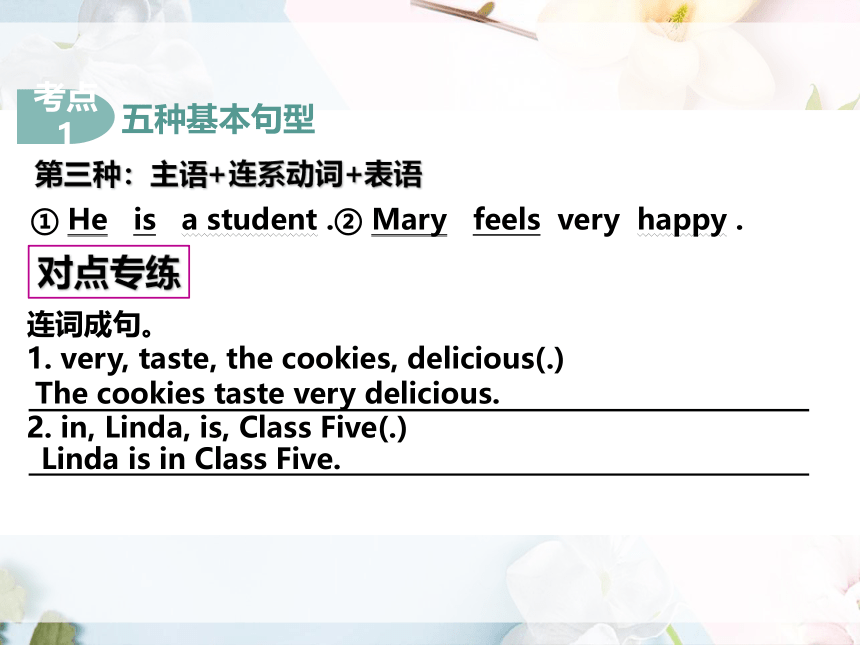
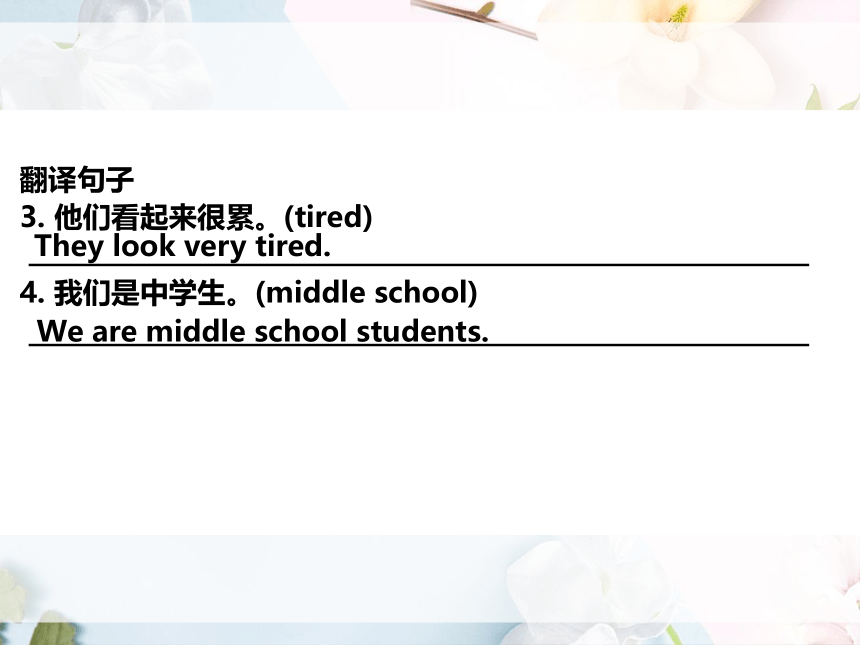
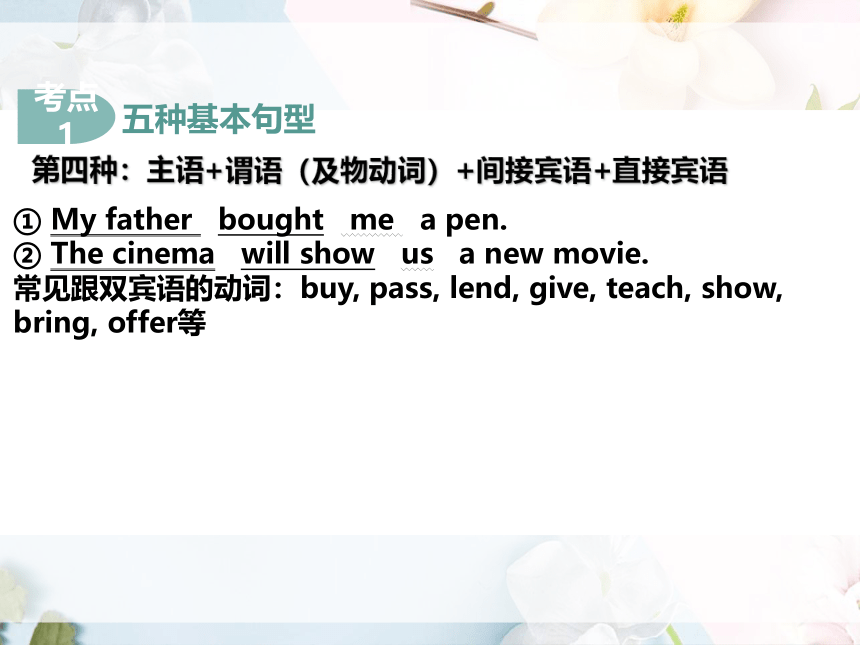
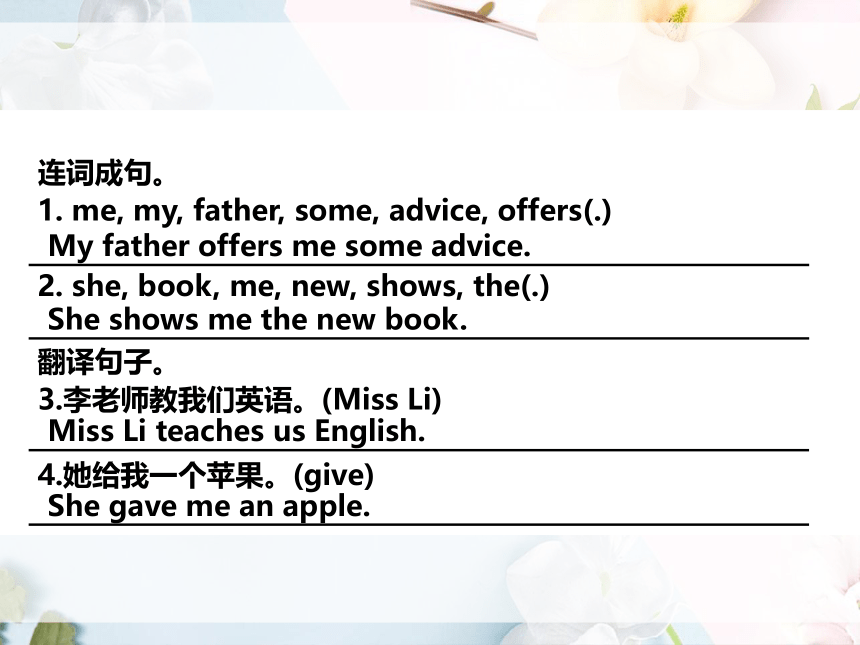
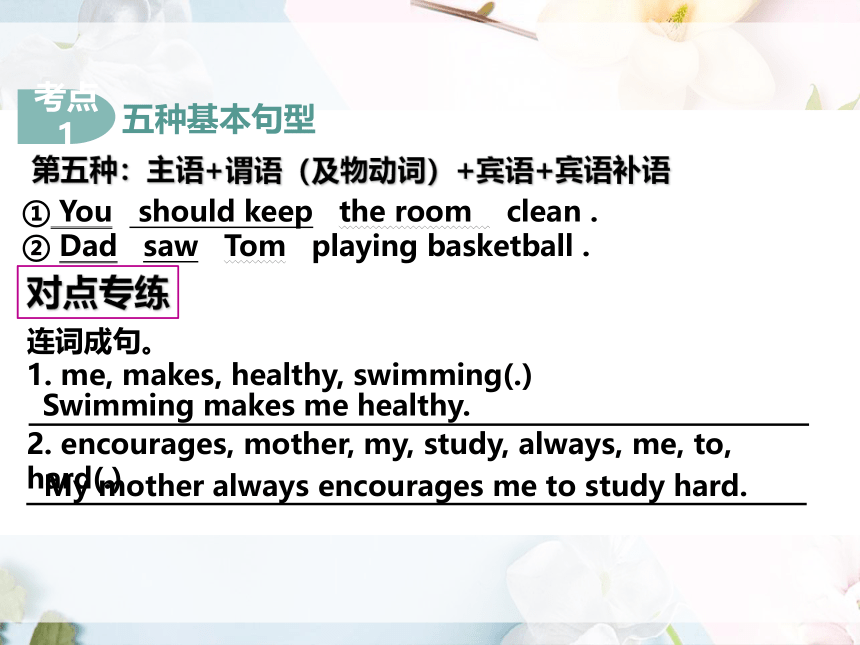
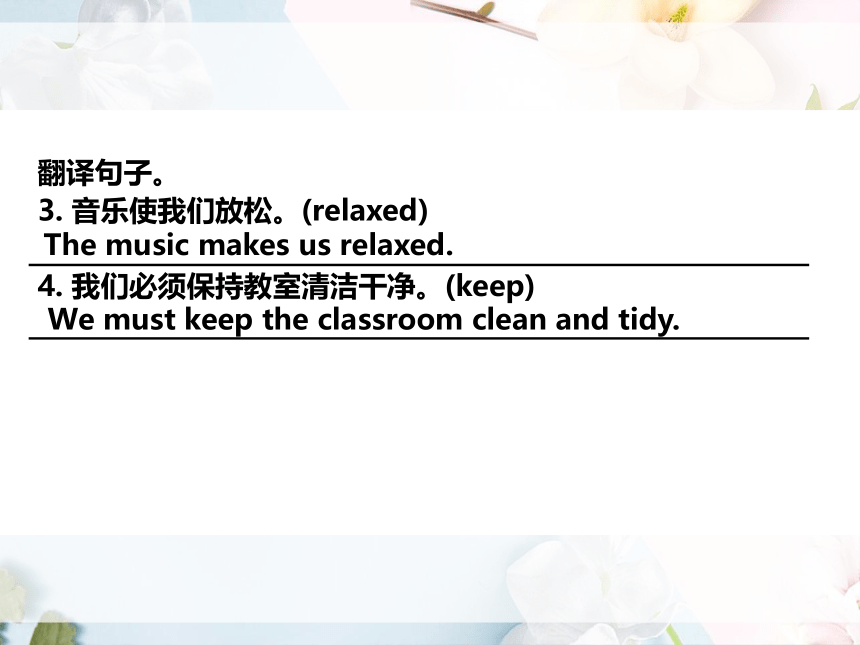
文档简介
(共36张PPT)
初三语法专题复习简单句
PART ONE
知识导图
五种基本句型
考点1
第一种:主语+谓语(不及物动词)(+状语)
① She always smiles . ② Joan works in a bookshop.
对点专练
连词成句。
1. the, father, hospital, works, my, in(.)
2. come, dream, my, will, true(.)
My father works in the hospital.
My dream will come true.
翻译句子。
3. 我每天很早起床。(early)
4. 我们在学校努力学习。(hard)
I get up early every day.
We study/work hard at school.
五种基本句型
考点1
第二种:主语+谓语(及物动词)+宾语(+状语)
① We like movies .② I bought a book yesterday.
对点专练
连词成句。
1. newspaper, reads, every morning, my, father(.)
2. Great Wall, will, we, visit, the(.)
My father reads newspaper every morning.
We will visit the Great wall.
翻译句子。
3. 她喜欢读书。(like)
4. 我每天晚上弹钢琴。(play)
She likes reading books./She likes to read books.
I play the piano every night.
五种基本句型
考点1
第三种:主语+连系动词+表语
① He is a student .② Mary feels very happy .
对点专练
连词成句。
1. very, taste, the cookies, delicious(.)
2. in, Linda, is, Class Five(.)
The cookies taste very delicious.
Linda is in Class Five.
翻译句子
3. 他们看起来很累。(tired)
4. 我们是中学生。(middle school)
They look very tired.
We are middle school students.
五种基本句型
考点1
第四种:主语+谓语(及物动词)+间接宾语+直接宾语
① My father bought me a pen.
② The cinema will show us a new movie.
常见跟双宾语的动词:buy, pass, lend, give, teach, show, bring, offer等
连词成句。
1. me, my, father, some, advice, offers(.)
2. she, book, me, new, shows, the(.)
翻译句子。
3.李老师教我们英语。(Miss Li)
4.她给我一个苹果。(give)
My father offers me some advice.
She shows me the new book.
Miss Li teaches us English.
She gave me an apple.
五种基本句型
考点1
第五种:主语+谓语(及物动词)+宾语+宾语补语
① You should keep the room clean .
② Dad saw Tom playing basketball .
对点专练
连词成句。
1. me, makes, healthy, swimming(.)
2. encourages, mother, my, study, always, me, to, hard(.)
Swimming makes me healthy.
My mother always encourages me to study hard.
翻译句子。
3. 音乐使我们放松。(relaxed)
4. 我们必须保持教室清洁干净。(keep)
The music makes us relaxed.
We must keep the classroom clean and tidy.
考点一:五种基本句型
1.主语+谓语(不及物动词)(+状语)
(1)She always smiles (2) Joan works in a bookshop.
翻译句子。
1. 我每天很早起床。(early)
2. 我们在学校努力学习。(hard)
2.主语+谓语(及物动词)+宾语(+状语)
① We like movies .② I bought a book yesterday.
1. 她喜欢读书。(like)
2. 我每天晚上弹钢琴。(play)
I get up early every day.
We study/work hard at school.
She likes reading books./She likes to read books.
I play the piano every night.
3.主语+连系动词+表语
① He is a student .② Mary feels very happy .
翻译句子
1. 他们看起来很累。(tired)
2. 我们是中学生。(middle school)
4.主语+谓语(及物动词)+间接宾语+直接宾语
① My father bought me a pen.
② The cinema will show us a new movie.
常见跟双宾语的动词:buy, pass, lend, give, teach, show, bring, offer等
翻译句子。
1.李老师教我们英语。(Miss Li)
2.她给我一个苹果。(give)
They look very tired.
We are middle school students.
Miss Li teaches us English.
She gave me an apple.
5.主语+谓语(及物动词)+宾语+宾语补语
You should keep the room clean .
Dad saw Tom playing basketball .
1. 音乐使我们放松。(relaxed)
2. 我们必须保持教室清洁干净。(keep)
The music makes us relaxed.
We must keep the classroom clean and tidy.
祈使句
考点3
用来表示命令、请求、建议、劝告等意义的句子。祈使句常省去主语you。
1. 肯定结构:动词原形开头。
例如:________开门!______________让我来帮你!
2.否定结构:在动词原形前面加don’t。
例如:________________不要打开电视机!
3. 一般在句首或句尾加please表示委婉语气。但please放在词尾时,前面用逗号隔开。
例如:Please help yourself to some fish! 请随便吃点鱼吧!____________________请回位就座!
4. 有些可用no开头,用来表示禁止性的祈使句。
例如:___________禁止吸烟!
There be句型
考点4
There be句型表示“某处有某人(事物)”。be动词的形式与最靠近它的名词形式一致。
例子 技巧
There is/was a book and two pens on the desk. 桌面上有一本书和两支钢笔。 a book最靠近be动词,故用is/was
There are/were two pens and a book on the desk. 桌面上有两支钢笔和一本书。 two pens最靠近be动词,故用are/were
There will be more trees in the garden soon. =There are going to be more trees in the garden soon. 这个花园很快就会有更多的树。 will be=is/are going to be将会有
There used to be a big house in front of the mountain. 在山的前面曾经有一间大屋。 used to be曾经有
一、语法点单句特训
( )1.(2021·云南中考)—Our class won the first prize in today’s basketball match.
— exciting news it is! We’re all glad about it.
A.What B.What an C.How D.How an
A
( )2.(2021·四川遂宁中考)—He has made many friends since he came here three weeks ago.
— outgoing boy he is!
A.How a B.How
C.What a D.What an
D
( )3.(2021·辽宁鞍山中考)— useful advice on English learning Mr.Li gave us!
—I agree. I think we have improved our English with his help.
A.What B.What a C.How D.How a
( )4.(2021·广西百色中考)— fast China is developing!
—Yes, we are so lucky to live in such a great country!
A.What B.What a C.How D.How a
C
A
( )5.(2021·江苏宿迁中考)— nice music lesson Mrs Wu gave us today!
—Yes. We enjoyed it very much.
A.What B.What a C.How D.How a
( )6.(2021·四川凉山中考)—Ivy, hard you are working!
—President Xi always says that the more hard-working we are, the luckier we will be.
A.how B.what C.what a D.what an
A
B
( )7.(2021·辽宁丹东中考)If you want to get good grades,
in as much effort as possible.
A.putting B.put C.to put D.puts
( )8.(2021·辽宁大连中考) at people when you talk. This is a polite way of communication in China.
A.Look B.Looking
C.To look D.Looked
A
B
( )9.(2021·新疆中考)There an English show this weekend. Shall we go and watch it
A.are going to be B.was C.will be D.were
( )10.(2021·四川遂宁中考)The number of the whales
smaller and smaller because of human activities now.
A.were B.was C.is D.are
C
C
(一)语法选择
There 1 so many kinds of chocolate in a shop in the factory.Finally, we bought some chocolate at a very low price.This field trip taught me 2 important role technology plays.I also learned about the chocolate industry.
( )1.A.are B.were C.have D.has
( )2.A.what an B.how C.what D.how an
A
B
(二)语法选择
To solve this problem, scientists advise that students should get less school work and more time to sleep.There
1 some other ways to help people get enough sleep, such as taking a 20-minute nap during the day.Good sleeping habits are also helpful.For example, 2 to go to sleep and wake up at the same time every day, even on weekends and during holidays.
( )1.A.is B.are C.was D.were
( )2.A.to try B.trying C.tried D.try
D
B
(三)短文填空
Hi Alice,
My name’s Zhao Ming and I’d like to be your pen friend. I 1. 16 years old. I have two little brothers. They’re very lovely. I often help my parents look after them in my spare time. My mother 2. in a toy shop. She loves her job. And my father is an engineer. He is busy every day, but he tries to spend more 3. with us.
time
works
am
I’m in the school basketball team. We usually play matches on Saturday mornings. Last week, we played against another school. They ran faster than us. However, we had better teamwork. Finally, we won!4. happy we were! This is the eighth time we beat them.
Could you tell 5. something about you Please write to me.
Best,
Zhao Ming
me
How
一、语法选择
A man lived in a small village and he always wanted to be successful. One day he went to ask a master, “Master, I wonder 1 I can create a miracle(奇迹).” The master replied, “It is not very difficult. Work seriously, hard and insistently(持续地), 2 you will create a miracle.”
The man did not understand and asked, “Why ” The master replied, “Now burn and cook for 3 , and when you finish it, I’ll tell you why.”
Then he began to cook for the master. Half an hour later, the rice 4 . The man carried the rice to the master. The master asked, “How did you cook 5 meal ” The man answered, “I cooked it 6 adding wood and fire continuously, and then the meal was cooked naturally.” The master said, “When you began to cook, it was raw(生的) rice, so you didn’t stop adding wood and fire until the raw rice was cooked. You made a miracle. 7 amazing it is!”
The man understood suddenly and said, “It isn’t mysterious 8 a miracle.” Ever since then, the man did everything seriously, and no matter what 9 he met, he would stick to his goal. As last he turned out to be one of the 10 men in his village. If you want to succeed, remember this: Work seriously, hard and insistently and a miracle will appear naturally.
( )1. A. what B. when C. how D. where
( )2. A. or B. and C. so D. but
( )3. A. I B. my C. me D. mine
( )4. A. is cooking B. is cooked
C. was cooking D. was cooked
( )5. A. a B. an C. the D. /
( )6. A. by B. in C. against D. after
( )7. A. How B. What C. What a D. What an
( )8. A. create B. to create C. creating D. creates
( )9. A. difficult B. difficultly C. difficulty D. difficulties
( )10. A. successful B. more successful
C. most successful D. most successfully
C
D
B
A
A
C
D
C
B
C
二、短文填空
It is said that tea can improve creative power of the literary (文学的) artists in ancient China.
According to Lu Yu’s Tea Classics, tea-drinking in China can be traced back (追溯) to the Zhou Dynasty—tea was discovered by Shen Nong and became popular as a
1. . in the State of Lu because of Zhou Gong.
drink
Tea-drinking in China has a 2. of four thousand years. As the legend (传说) has it, Shen Nong
3. hundreds of wild plants to see which were poisonous(有毒的), in order to prevent people 4. . eating the poisonous plants. It is said that he was once poisoned 5. was saved by eating some leaves of an evergreen plant with white flowers. Later, people 6.
the leaves that saved his life “cha”.
called/named
but
from
tasted
history
In modern times, people still keep tea-drinking as 7. . of their daily activities. According to the study, tea can also have effects on some modern illnesses. To those who have to work with computers for a long time, drinking tea can help 8.
build up a wall against the computer radiation(辐射). To those who may have 9. much fat, drinking tea can help them to recreate a new balance in their bodies. And to those aged people, drinking tea is also a good 10. . to keep a calm mood for a longer life.
way
too
them
one
初三语法专题复习简单句
PART ONE
知识导图
五种基本句型
考点1
第一种:主语+谓语(不及物动词)(+状语)
① She always smiles . ② Joan works in a bookshop.
对点专练
连词成句。
1. the, father, hospital, works, my, in(.)
2. come, dream, my, will, true(.)
My father works in the hospital.
My dream will come true.
翻译句子。
3. 我每天很早起床。(early)
4. 我们在学校努力学习。(hard)
I get up early every day.
We study/work hard at school.
五种基本句型
考点1
第二种:主语+谓语(及物动词)+宾语(+状语)
① We like movies .② I bought a book yesterday.
对点专练
连词成句。
1. newspaper, reads, every morning, my, father(.)
2. Great Wall, will, we, visit, the(.)
My father reads newspaper every morning.
We will visit the Great wall.
翻译句子。
3. 她喜欢读书。(like)
4. 我每天晚上弹钢琴。(play)
She likes reading books./She likes to read books.
I play the piano every night.
五种基本句型
考点1
第三种:主语+连系动词+表语
① He is a student .② Mary feels very happy .
对点专练
连词成句。
1. very, taste, the cookies, delicious(.)
2. in, Linda, is, Class Five(.)
The cookies taste very delicious.
Linda is in Class Five.
翻译句子
3. 他们看起来很累。(tired)
4. 我们是中学生。(middle school)
They look very tired.
We are middle school students.
五种基本句型
考点1
第四种:主语+谓语(及物动词)+间接宾语+直接宾语
① My father bought me a pen.
② The cinema will show us a new movie.
常见跟双宾语的动词:buy, pass, lend, give, teach, show, bring, offer等
连词成句。
1. me, my, father, some, advice, offers(.)
2. she, book, me, new, shows, the(.)
翻译句子。
3.李老师教我们英语。(Miss Li)
4.她给我一个苹果。(give)
My father offers me some advice.
She shows me the new book.
Miss Li teaches us English.
She gave me an apple.
五种基本句型
考点1
第五种:主语+谓语(及物动词)+宾语+宾语补语
① You should keep the room clean .
② Dad saw Tom playing basketball .
对点专练
连词成句。
1. me, makes, healthy, swimming(.)
2. encourages, mother, my, study, always, me, to, hard(.)
Swimming makes me healthy.
My mother always encourages me to study hard.
翻译句子。
3. 音乐使我们放松。(relaxed)
4. 我们必须保持教室清洁干净。(keep)
The music makes us relaxed.
We must keep the classroom clean and tidy.
考点一:五种基本句型
1.主语+谓语(不及物动词)(+状语)
(1)She always smiles (2) Joan works in a bookshop.
翻译句子。
1. 我每天很早起床。(early)
2. 我们在学校努力学习。(hard)
2.主语+谓语(及物动词)+宾语(+状语)
① We like movies .② I bought a book yesterday.
1. 她喜欢读书。(like)
2. 我每天晚上弹钢琴。(play)
I get up early every day.
We study/work hard at school.
She likes reading books./She likes to read books.
I play the piano every night.
3.主语+连系动词+表语
① He is a student .② Mary feels very happy .
翻译句子
1. 他们看起来很累。(tired)
2. 我们是中学生。(middle school)
4.主语+谓语(及物动词)+间接宾语+直接宾语
① My father bought me a pen.
② The cinema will show us a new movie.
常见跟双宾语的动词:buy, pass, lend, give, teach, show, bring, offer等
翻译句子。
1.李老师教我们英语。(Miss Li)
2.她给我一个苹果。(give)
They look very tired.
We are middle school students.
Miss Li teaches us English.
She gave me an apple.
5.主语+谓语(及物动词)+宾语+宾语补语
You should keep the room clean .
Dad saw Tom playing basketball .
1. 音乐使我们放松。(relaxed)
2. 我们必须保持教室清洁干净。(keep)
The music makes us relaxed.
We must keep the classroom clean and tidy.
祈使句
考点3
用来表示命令、请求、建议、劝告等意义的句子。祈使句常省去主语you。
1. 肯定结构:动词原形开头。
例如:________开门!______________让我来帮你!
2.否定结构:在动词原形前面加don’t。
例如:________________不要打开电视机!
3. 一般在句首或句尾加please表示委婉语气。但please放在词尾时,前面用逗号隔开。
例如:Please help yourself to some fish! 请随便吃点鱼吧!____________________请回位就座!
4. 有些可用no开头,用来表示禁止性的祈使句。
例如:___________禁止吸烟!
There be句型
考点4
There be句型表示“某处有某人(事物)”。be动词的形式与最靠近它的名词形式一致。
例子 技巧
There is/was a book and two pens on the desk. 桌面上有一本书和两支钢笔。 a book最靠近be动词,故用is/was
There are/were two pens and a book on the desk. 桌面上有两支钢笔和一本书。 two pens最靠近be动词,故用are/were
There will be more trees in the garden soon. =There are going to be more trees in the garden soon. 这个花园很快就会有更多的树。 will be=is/are going to be将会有
There used to be a big house in front of the mountain. 在山的前面曾经有一间大屋。 used to be曾经有
一、语法点单句特训
( )1.(2021·云南中考)—Our class won the first prize in today’s basketball match.
— exciting news it is! We’re all glad about it.
A.What B.What an C.How D.How an
A
( )2.(2021·四川遂宁中考)—He has made many friends since he came here three weeks ago.
— outgoing boy he is!
A.How a B.How
C.What a D.What an
D
( )3.(2021·辽宁鞍山中考)— useful advice on English learning Mr.Li gave us!
—I agree. I think we have improved our English with his help.
A.What B.What a C.How D.How a
( )4.(2021·广西百色中考)— fast China is developing!
—Yes, we are so lucky to live in such a great country!
A.What B.What a C.How D.How a
C
A
( )5.(2021·江苏宿迁中考)— nice music lesson Mrs Wu gave us today!
—Yes. We enjoyed it very much.
A.What B.What a C.How D.How a
( )6.(2021·四川凉山中考)—Ivy, hard you are working!
—President Xi always says that the more hard-working we are, the luckier we will be.
A.how B.what C.what a D.what an
A
B
( )7.(2021·辽宁丹东中考)If you want to get good grades,
in as much effort as possible.
A.putting B.put C.to put D.puts
( )8.(2021·辽宁大连中考) at people when you talk. This is a polite way of communication in China.
A.Look B.Looking
C.To look D.Looked
A
B
( )9.(2021·新疆中考)There an English show this weekend. Shall we go and watch it
A.are going to be B.was C.will be D.were
( )10.(2021·四川遂宁中考)The number of the whales
smaller and smaller because of human activities now.
A.were B.was C.is D.are
C
C
(一)语法选择
There 1 so many kinds of chocolate in a shop in the factory.Finally, we bought some chocolate at a very low price.This field trip taught me 2 important role technology plays.I also learned about the chocolate industry.
( )1.A.are B.were C.have D.has
( )2.A.what an B.how C.what D.how an
A
B
(二)语法选择
To solve this problem, scientists advise that students should get less school work and more time to sleep.There
1 some other ways to help people get enough sleep, such as taking a 20-minute nap during the day.Good sleeping habits are also helpful.For example, 2 to go to sleep and wake up at the same time every day, even on weekends and during holidays.
( )1.A.is B.are C.was D.were
( )2.A.to try B.trying C.tried D.try
D
B
(三)短文填空
Hi Alice,
My name’s Zhao Ming and I’d like to be your pen friend. I 1. 16 years old. I have two little brothers. They’re very lovely. I often help my parents look after them in my spare time. My mother 2. in a toy shop. She loves her job. And my father is an engineer. He is busy every day, but he tries to spend more 3. with us.
time
works
am
I’m in the school basketball team. We usually play matches on Saturday mornings. Last week, we played against another school. They ran faster than us. However, we had better teamwork. Finally, we won!4. happy we were! This is the eighth time we beat them.
Could you tell 5. something about you Please write to me.
Best,
Zhao Ming
me
How
一、语法选择
A man lived in a small village and he always wanted to be successful. One day he went to ask a master, “Master, I wonder 1 I can create a miracle(奇迹).” The master replied, “It is not very difficult. Work seriously, hard and insistently(持续地), 2 you will create a miracle.”
The man did not understand and asked, “Why ” The master replied, “Now burn and cook for 3 , and when you finish it, I’ll tell you why.”
Then he began to cook for the master. Half an hour later, the rice 4 . The man carried the rice to the master. The master asked, “How did you cook 5 meal ” The man answered, “I cooked it 6 adding wood and fire continuously, and then the meal was cooked naturally.” The master said, “When you began to cook, it was raw(生的) rice, so you didn’t stop adding wood and fire until the raw rice was cooked. You made a miracle. 7 amazing it is!”
The man understood suddenly and said, “It isn’t mysterious 8 a miracle.” Ever since then, the man did everything seriously, and no matter what 9 he met, he would stick to his goal. As last he turned out to be one of the 10 men in his village. If you want to succeed, remember this: Work seriously, hard and insistently and a miracle will appear naturally.
( )1. A. what B. when C. how D. where
( )2. A. or B. and C. so D. but
( )3. A. I B. my C. me D. mine
( )4. A. is cooking B. is cooked
C. was cooking D. was cooked
( )5. A. a B. an C. the D. /
( )6. A. by B. in C. against D. after
( )7. A. How B. What C. What a D. What an
( )8. A. create B. to create C. creating D. creates
( )9. A. difficult B. difficultly C. difficulty D. difficulties
( )10. A. successful B. more successful
C. most successful D. most successfully
C
D
B
A
A
C
D
C
B
C
二、短文填空
It is said that tea can improve creative power of the literary (文学的) artists in ancient China.
According to Lu Yu’s Tea Classics, tea-drinking in China can be traced back (追溯) to the Zhou Dynasty—tea was discovered by Shen Nong and became popular as a
1. . in the State of Lu because of Zhou Gong.
drink
Tea-drinking in China has a 2. of four thousand years. As the legend (传说) has it, Shen Nong
3. hundreds of wild plants to see which were poisonous(有毒的), in order to prevent people 4. . eating the poisonous plants. It is said that he was once poisoned 5. was saved by eating some leaves of an evergreen plant with white flowers. Later, people 6.
the leaves that saved his life “cha”.
called/named
but
from
tasted
history
In modern times, people still keep tea-drinking as 7. . of their daily activities. According to the study, tea can also have effects on some modern illnesses. To those who have to work with computers for a long time, drinking tea can help 8.
build up a wall against the computer radiation(辐射). To those who may have 9. much fat, drinking tea can help them to recreate a new balance in their bodies. And to those aged people, drinking tea is also a good 10. . to keep a calm mood for a longer life.
way
too
them
one
同课章节目录
- 词法
- 名词
- 动词和动词短语
- 动词语态
- 动词时态
- 助动词和情态动词
- 非谓语动词
- 冠词
- 代词
- 数词和量词
- 形容词副词及其比较等级
- 介词和介词短语
- 连词和感叹词
- 构词法
- 相似、相近词比较
- 句法
- 陈述句
- 一般疑问句和否定疑问句
- 特殊疑问句及选择疑问句
- 反意疑问句
- 存在句(There be句型)
- 宾语从句
- 定语从句
- 状语从句
- 主谓一致问题
- 简单句
- 并列句
- 复合句
- 主谓一致
- 主、表语从句
- 名词性从句
- 直接引语和间接引语
- 虚拟语气
- 感叹句
- 强调句
- 倒装句
- 祈使句
- 句子的成分
- 句子的分类
- 题型专区
- 单项选择部分
- 易错题
- 完形填空
- 阅读理解
- 词汇练习
- 听说训练
- 句型转换
- 补全对话
- 短文改错
- 翻译
- 书面表达
- 任务型阅读
- 语法填空
- 其他资料
